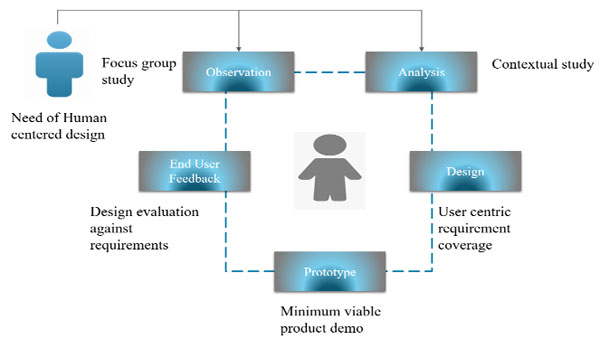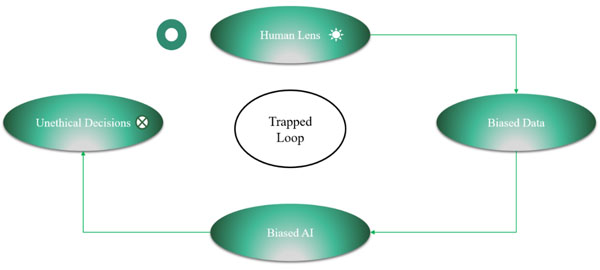Theorizing Debiasing attempt to ensure better Human Machine Synergy
Of late Artificial Intelligence has become the fulcrum of numerous transformative changes, because of this extensive usability, it is now inextricably connected with our typical daily life. Starting from healthcare to weather prediction and portfolio optimization, it is present everywhere. On the contrary the perception about its offerings is not so promising, to the extent it has raised some serious concerns about the fairness of its decision-making processes across numerous domains. We have limited choices on how the same will be accepted, as majority of our ecosystem is inequitable and exclusionary. This has become a challenge to implement AI with fairness and get a response from the end users the same way. Information service professionals need to be well versed with these ethical nuances as they work with AI applications extensively. Recent research has indicated that there are still some impediments, among the most severe concerns, explainability, data biases, data security and privacy and group specific discrimination in the evaluation process are a few so called noteworthy abnormalities. This has also been observed that the growing use of AI has a profound environmental impact. AI/ML models generate a large amount of carbon footprint and that adversely impact environmental ecosystem. Hence it is imperative that environmental ethicists and technology experts must make salient contributions.
In the current context we will try to evaluate the favorable outcome of human and machine collaboration in the view of industry 5.0 using Hunt-Vitell (H-V) theory. Though Hunt Vitell model intended for marketing domain, later it evolved more because of its distinct socio- economic relevance. More from a generic model perspective it enumerates ethical decision making from the context of behavioral marketing. However, Hunt–Vitell model establishes how ethical decisions are predicated not from the potential benefits only, essentially it states deontological evaluations are also critical that deduce norms and values, which are the backbones of trustworthy decision-making process. Ethical decisions in business interactions are a long-debated topic and plenty of researchers have worked on the same. The Hunt-Vitell (H-V) model of marketing ethics has been validated by many researchers. This model explains how people make ethical decisions. In the current context AI is trying to replace humans and applying algorithmic decision-making techniques. However, when we perceive this from Industry 5.0 perspectives, it focuses more on human and machine synergy. Machine should never replace human rather it must accommodate human centricity to augment the process holistically.
As it is depicted below, information is disseminated from the source and processed through computing platforms to produce final task output. For many end-users AI system appears to be a Blackbox. How the decision support system is working that needs a clear explainability. Many a times the training data fed to generate the models itself are the sources of unconscious
human biases. We will see how Hunt Vitell model can help to bolster the human machine synergy.

Deontology is an ethical theory that helps to distinguish ethical intent that substantiates right decision making is certainly a prerogative for the end users and it is a responsibility for the AI system designers. When both work in absolute synergy, information may be captured through any of them, most importantly enrichment should be collaborative. Purposive collaboration is the bridge between ethically responsive behavior that comes from human enables machines to create ethical context for the resolutions. Ethical aspiration is the driving force that will help combine the two and acts as a catalyst to enable debiasing techniques.
In other words, we can infer Human oversight is must for algorithmic decisions. Here human plays a role of ensuring quality and seamless delivery. It’s very important to have “human in the loop” for automated decision-making (Jones, 2017; Wagner, 2019). It’s not apparent how much oversight is required for human algorithms interactions. The researchers usually express reservations in limiting human oversight, specifically related to end user’s overdependence on algorithmic advice (Engstrom et al., 2020).

Above diagram represents how a comprehensive human machine collaboration can be implemented. We see at every stage of AI lifecycle human centricity is ensured. This is the best possible approach that can be thought of to protect unethical outcomes. To make it even simplified human supervisory lens is rechristened as a cohesive synergy. Ideally it should be an iterative process till the quality is met. We can safely refer this as trapped loop.
It resonates on the AI dependence on the human generated data derived from multiple and disparate data sources which are used and synthesized accordingly. Even after that it’s difficult to control as external ecosystems consume this data through different channels, that affects the information for future algorithms, therefore it represents a close loop that hinders controls on the decision support systems. Therefore, it’s an arduous task to design innovative operating model that will ensure better interactions between human and machines, that is the primary intention for industry 5.0.

Finally, AI is often verified and validated with multi layers of oversight, including external regulations and internal governance. A regulation is a government rule enforced by law. The periphery of regulations is changing dramatically, and it’s essential to understand primary pillars of regulation to design, build, and implement AI legally and ethically. Regulations and governance should be risk based, contextual, and can ensure assigning responsibilities to the parties those are highly exposed. To have a successful model industry 5.0 should focus to earmark these interstices.
About the Author:

Mr. Raja Basu is a Senior consulting professional in the Technology
Consulting space specializing in financial services. He is a highly accomplished industry professional who has worked for numerous global clients. He has special interest in ethical use of AI and Sustainability.
Mr. Raja Basu is a Professional Mentor ( Industry ) in XLRI PGDM ( GM ).
Mr. Raja Basu is pursuing his doctoral program from XLRI Jamshedpur in the Information Systems area.
Mr. Raja Basu can be Contacted at :
Email : [email protected]
LinkedIn : https://www.linkedin.com/in/ra
Mr. Raja Basu is Accorded with the following Honors & Awards :
https://www.linkedin.com/in/ra
Mr. Raja Basu is Bestowed with the following Licences & Certifications :
https://www.linkedin.com/in/ra
Mr. Raja Basu is Volunteering in the following International Industry Associations & Institutions :
https://www.linkedin.com/in/ra
Mr. Yogesh Khadilkar is a Senior Management professional with around 22
years of experience in Business Development. He has been in the Information Technology space since 2000 and has worked with leading IT MNC’s, managing critical customers and partners relationships.
Mr. Yogesh Khadilkar is currently pursuing his doctoral studies at XLRI, Jamshedpur in the Marketing area.
Mr. Yogesh Khadilkar can be Contacted at :
Email : [email protected], [email protected]
LinkedIn : https://www.linkedin.com/in/yo











